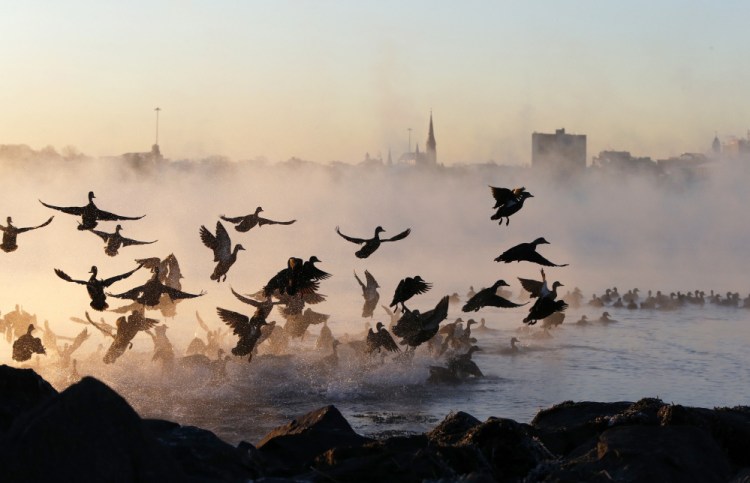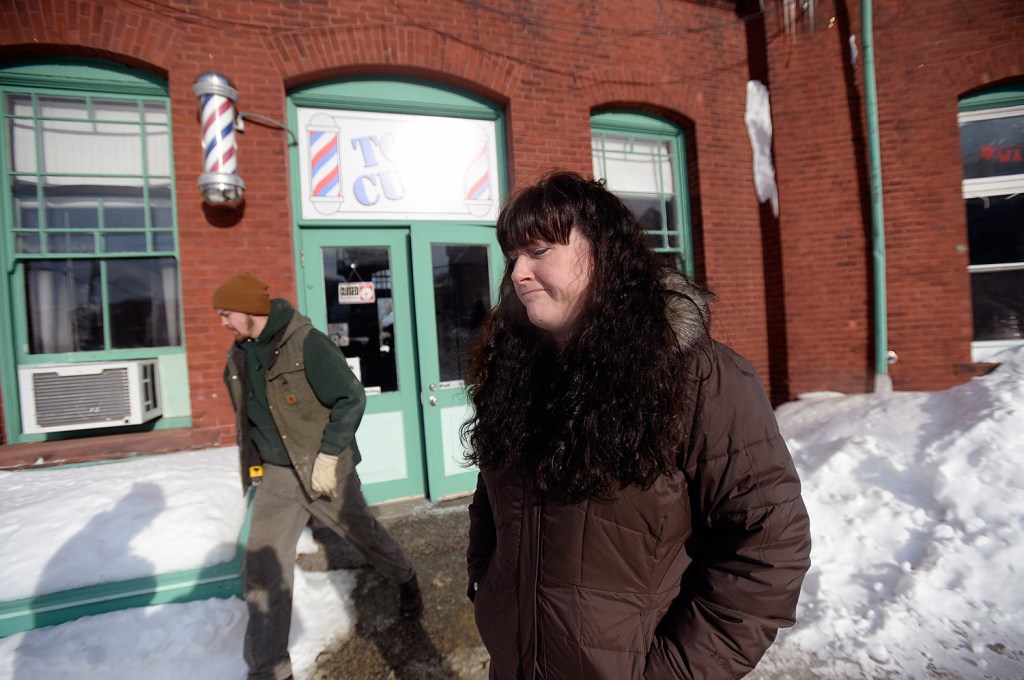Maine will partially emerge from a deep freeze Wednesday and Thursday, but another wave of teeth-chattering, below-zero temperatures will begin Friday – right on the heels of a potential blizzard.
The temperature in Portland sank to a record 17 degrees below zero early on New Year’s Day, beating the previous record of minus 12 for Jan. 1 set in 1957, the National Weather Service said. On Tuesday morning, it was only slightly warmer in Portland, registering minus 10 at 7 a.m.
Temperatures will warm to a relatively balmy 20 degrees Thursday, when a nor’easter accompanied by wind gusts of up to 50 mph is expected to roar into Maine, potentially dumping 9 to 12 inches along the coast, including Portland.
The weather service has issued a blizzard warning starting at noon Thursday through 1 p.m. on Friday. Here’s what to expect:
• Very dangerous to impossible travel conditions, including during the evening commute on Thursday.
• High winds, whiteout conditions and significant drifting.
• Tree damage and falling branches.
The weather service strongly advises staying home during the storm. For anyone who absolutely must travel, the weather service offers this advice: Carry a winter survival kit and if you get stranded, stay with your vehicle.
Weather service meteorologist Eric Sinsabaugh said Thursday’s storm will be a classic nor’easter.
On the bright side, he said, the snow will be light and fluffy, making shoveling easier.
Temperatures will plummet on Friday and Saturday, with lows of 10 below zero predicted for Portland on Friday and Saturday and highs of zero to 5 degrees.
BURST PIPES ‘LIKE NIAGARA FALLS’
The bitter cold that has gripped the region caused pipes to burst, drained car batteries, and forced school delays and closings Tuesday across Maine.
A damaged sprinkler system closed Noble High School in North Berwick, and buses that wouldn’t start closed schools in SAD 6 in Buxton. Other schools, such as Scarborough, operated on a delayed start because of the frigid temperatures. A water main break on New Year’s Day flooded East Grand Avenue in Scarborough, and about 100 homes were temporarily without water.
At Top Cuts barber shop in Westbrook, owner Ginny Ayers watched as workers replaced pipes on a sprinkler system that had burst early Tuesday morning, shortly after she arrived for work at 7:30 a.m.
“It was awful. They were just leaking at first but then they burst and it looked like Niagara Falls in here,” Ayers said. “I’ve never seen anything like it in my life.”
A few inches of bitterly cold water covered the hair salon, but Ayers said the fire department arrived “amazingly fast” and helped clean up the water and get repair crews in. Ayers said she hoped to reopen by Thursday.
Patrick Moody, spokesman for AAA of Northern New England, said the agency was deluged with calls over the holiday break, as people’s cars wouldn’t start or broke down. Moody said call volume was “off the charts” with thousands of calls Friday in Maine, New Hampshire and Vermont, and just as many if not more on Monday and Tuesday.
“A lot of people left their cars sitting for a few days and tried to start them, and they wouldn’t start,” Moody said. “If you need assistance, it’s going to take longer to get to you. We’re prioritizing the most dangerous situations first.”
JET STREAM UNCHARACTERISTICALLY STALLED
Sinsabaugh, the weather service meteorologist, said the jet stream – a narrow band of strong air currents that circle the globe several miles above Earth – has been uncharacteristically stalled in relatively the same location for the past few weeks, keeping the extreme cold temperatures from moving out.
“The jet stream pattern is pretty much stuck, and has been for the past three weeks,” Sinsabaugh said. “It’s steering cold air into the northern part of the country, especially into the Northeast.”
Sinsabaugh said it’s unclear how long the pattern will remain the same, meaning New Englanders could expect very cold temperatures potentially for weeks.
While much of the United States experiences the bitter cold, Sinsabaugh said global temperature maps show most of the world is having higher-than-average temperatures for this time of year. And the parked jet stream may be another impact of global warming, Sinsabaugh said.
“Research is showing that the weather patterns we’re seeing with the jet stream are highly correlated with the loss of Arctic sea ice,” he said.
LIFT TICKETS TAKE A DIP
Maine’s two biggest ski areas saw a dip in lift ticket sales during the frigid holiday week, but there’s optimism at Sugarloaf and Sunday River for the ski season ahead.
During the holiday week, Sunday River saw a 20 percent dip in day ticket sales compared with the same period last year, but lodging reservations were up 15 percent for the week and season pass sales are up 30 percent over last season, said Darcy Lambert, Sunday River director of communications.
Lambert said day ticket sales were probably down because of the sustained cold.
Sugarloaf saw a 15 percent decline in day ticket revenue for the holiday week, spokeswoman Noelle Tuttle said.
In the days before the vacation week, Sugarloaf was 11 percent ahead of last winter in day ticket revenue, and season pass sales are up 8 percent over last year, which Tuttle said is a record.
“So despite the cold, we are confident that there are plenty of people ready to get out skiing as soon as the temperatures turn around,” she said.
WORKING OVERTIME TO STAY WARM
Gregg Herrick was on the phone for more than four hours Tuesday seeking heating oil for his Poland home. He never got through to a human being.
In desperation, he called Sen. Susan Collins’ office for help.
That prompted a call back from his heating oil company, but the woman at the other end of the line told him the soonest she could promise a delivery was Friday.
Herrick, 71, is alone at the home where he’s lived for 41 years. He has heart problems and has suffered a stroke. His wife is at a nursing home battling brain cancer, he said, his voice breaking from the stress.
He tried several heating oil companies, but ended up on hold every place he tried.
“I think it’s wrong,” he said.
As the extreme cold continues, heating systems are working overtime to keep pace – making it difficult for delivery drivers and plumbing and heating contractors to keep up.
Paul Bissonnette, owner of Bissonnette Plumbing and Heating of Lewiston, said he can’t keep up with the roughly 30 calls a day he’s been getting for homes with no heat and water line freeze-ups.
Since last week, he and his three employees have been straight out, working up to 12-hour days through the weekend. He has “never seen it this bad” in the 30 years he’s owned his company.
One frantic woman called him at 3 a.m. Tuesday, waking him up. He urged her to wait until 7 a.m. when his workers start their day. By 9 a.m., he had received nearly a dozen calls.
Jeff Allen at Selco Plumbing and Heating Supplies in Auburn said a steady stream of contractors has been buying up materials to replace and repair frozen pipes and parts for furnaces.
“Everything’s failing more than normal,” he said. “Everything’s running twice as long, so you’re putting twice as much wear” on the heating systems.
Besides contractors looking for supplies, he’s been fielding calls from homeowners seeking contractors because they aren’t returning their calls, he said.
“I tell people, ‘Call and leave a message. That’s all you can do,’ ” he said.
As heating oil deliveries get pushed back, homes are plunged into the cold because they’re using more fuel and emptying their tanks, which causes more freeze-ups. That, in turn, drives a greater need for contractors.
“It’s getting crazy,” Allen said.
Richard Lambert, code enforcement director for the city of Saco, said he’s heard anecdotally that people with furnaces that need repair are having to wait longer for service.
“It’s been brutal. I’ve heard people are running house-to-house all day and night doing service calls for furnaces,” Lambert said.
HEATING FUEL SUPPLIES STABLE
Despite the backlog in fuel deliveries that some people experienced, energy markets in Maine appeared to be functioning normally Tuesday, industry officials said.
Heating oil and propane supplies were keeping pace, they said, with propane moving by rail again after the New Year’s holiday.
“We are monitoring the situation, as we would with any cold snap,” said Steve McGrath, director of the Governor’s Energy Office.
McGrath also noted that Gov. Paul LePage and federal officials had granted waivers last week allowing delivery drivers to work longer hours to move oil and propane.
“We’re still OK,” said Jamie Py, president of the Maine Energy Marketers Association, which represents many oil and propane dealers. “Demand is huge. We’ll see what happens after the predicted snowstorm, and cold temperatures this weekend.”
However, extra labor costs, along with upward movement of wholesale petroleum prices, are likely to push up heating oil prices in the coming weeks, Py speculated. The energy office’s periodic price survey wasn’t available Tuesday, but federal figures show Maine’s statewide average for heating oil was $2.60 a gallon on Christmas Day.
New England’s electric grid operator has taken steps to backstop natural gas generation, which faces supply and price problems in extreme weather. Gas plants were being supplemented with so-called dual-fuel plants that can burn both gas and oil, and by seldom-used oil-fired units. One of the largest standby units, Wyman Station in Yarmouth, was online Monday and Tuesday.
New England typically generates half its power with natural gas and only a percent or so with oil. On Tuesday, figures from ISO-New England, the regional grid operator, showed a fuel mix of 32 percent oil, 26 percent gas and 23 percent nuclear. Renewables were contributing 14 percent, with 5 percent coming from hydroelectric dams and 9 percent from a mix of wind, wood and refuse.
“We’re seeing the fuel diversity of the power generation fleet show its reliability and resilience in meeting a historic cold snap across New England,” said Dan Dolan, president of the New England Power Generators Association.
The cold weather has caused wholesale electricity prices to spike, which is why the grid operator and plant operators have contingency plans to shift fuel sources. But Dolan said wholesale prices are lower so far than what they were during the polar vortex three years ago.
This story will be updated.
Sun Journal Staff Writer Christopher Williams and Press Herald Staff Writers Deirdre Fleming, Tux Turkel and Dennis Hoey contributed to this report.
Joe Lawlor can be contacted at 791-6376 or at:
jlawlor@pressherald.com
Twitter: joelawlorph
Send questions/comments to the editors.





Success. Please wait for the page to reload. If the page does not reload within 5 seconds, please refresh the page.
Enter your email and password to access comments.
Hi, to comment on stories you must . This profile is in addition to your subscription and website login.
Already have a commenting profile? .
Invalid username/password.
Please check your email to confirm and complete your registration.
Only subscribers are eligible to post comments. Please subscribe or login first for digital access. Here’s why.
Use the form below to reset your password. When you've submitted your account email, we will send an email with a reset code.